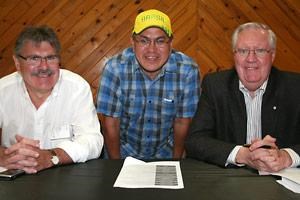Ratification of Tla’Amin (Sliammon) First Nation’s treaty is stalled because the federal government has not initialed the draft agreement.
Tla’Amin, provincial and federal chief negotiators shook hands eight months ago, signaling they had reached agreement on a final treaty. Tla’Amin and the province have both signed off on it but federal government officials have not.
Sophie Pierre, chief commissioner for the BC Treaty Commission, said the delay is unacceptable. “It really creates a question about the whole process,” she said. “While it affects Sliammon directly, it also has an impact on the rest of treaty negotiations.”
The commission hasn’t been able to get an answer on when the federal government is going to sign off on the agreement, Pierre said. “They just keep saying it’s within the system. But when you look behind what that means, where in the system it’s going, it starts to become clear it’s not the system that’s holding it up. It makes one wonder if it hasn’t become political and that’s why it’s being held up.”
The federal government has to be accountable for the delay, Pierre said. “We really need some accountability here, about why Sliammon has been held up so long and why Sliammon should have to be responsible for the debt created in that eight months that they’ve been held in limbo. I really think that the feds need to revisit the fact that Sliammon has had to take out a loan in these past eight months.”
Roy Francis, Tla’Amin’s chief negotiator, said he has not been told why the delay has occurred. The federal government’s chief negotiator, Tom Molloy, has told him the agreement is under review and the negotiating team is waiting for approval. “That’s all he’s been able to say to us,” Francis said. “I would guess there is political interference.”
Francis pointed out that for both the Tsawwassen First Nation and Maa-nulth First Nations final treaties, it took eight weeks for the federal government to initial the agreements. “We’re frustrated, very frustrated. It makes you question the intent.”
The delay is also discouraging, Francis said. “We pushed hard and we felt we had accomplished something, something important, something huge. It’s taken the wind out of everyone’s sails.”
The longer the wait, the more difficult it becomes for negotiators to explain it to the community, Francis added, and the feeling that the federal government doesn’t intend to keep its word is growing. “Mistrust is festering in the community,” he said. “We’re out promoting this package, which is an improvement for Sliammon, and the longer we go without any approval, the more that message fades away.”
As well, Tla’Amin officials are concerned the government is going to come back with changes to the document, Francis said. “The message from our end is no,” he said. “There is no room for changes and there’s no appetite for it if there’s any indication of change coming down; it basically sinks our arrangement.”
The community has given negotiators a strong message that it has borrowed enough money, Francis added. “We don’t want to be borrowing further. We want to get this deal completed now.”
Geneviève Guibert, a spokesperson for Indian and Northern Affairs Canada, said Canada is currently concluding a review of the negotiators’ understanding and, on successful conclusion, will be in a position to initial the draft final agreement.



